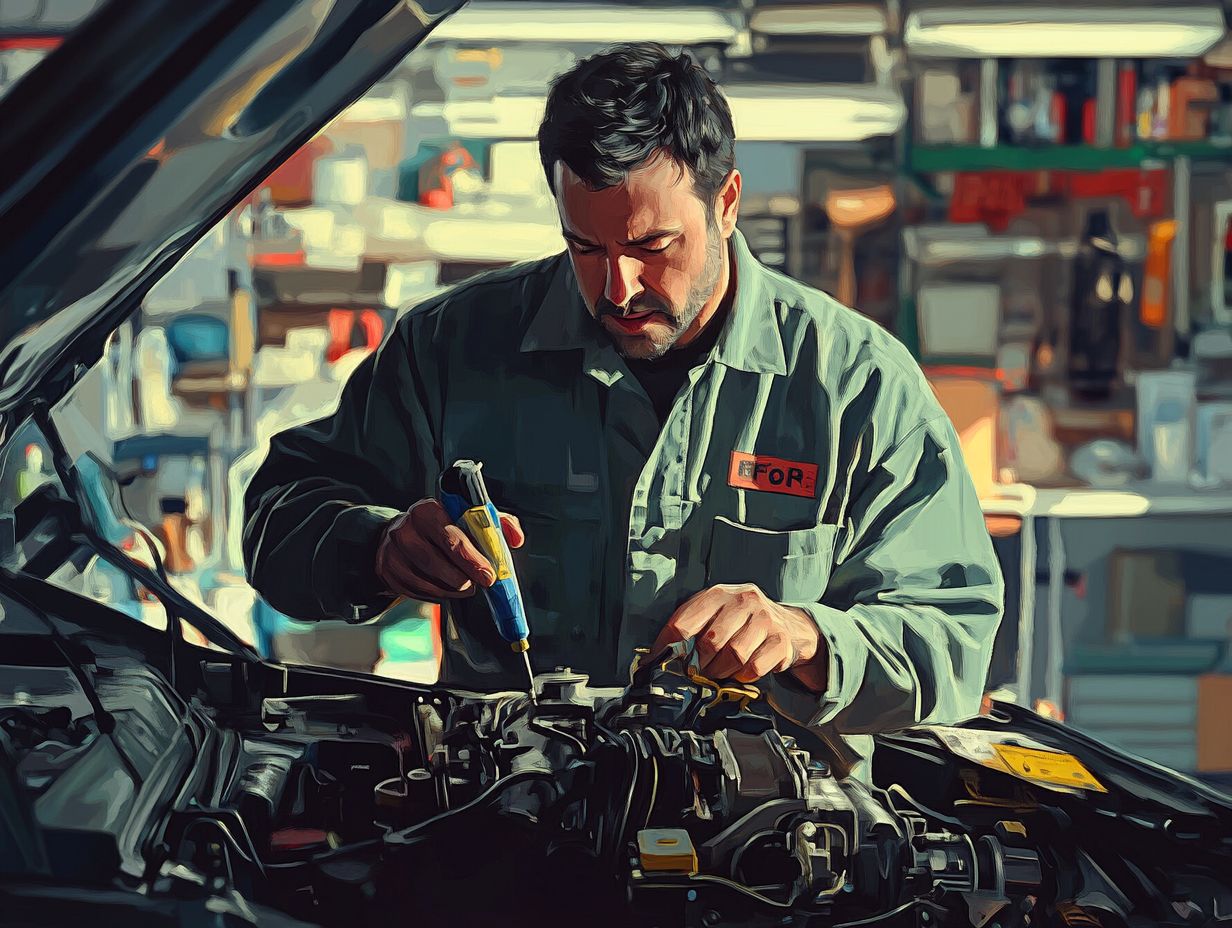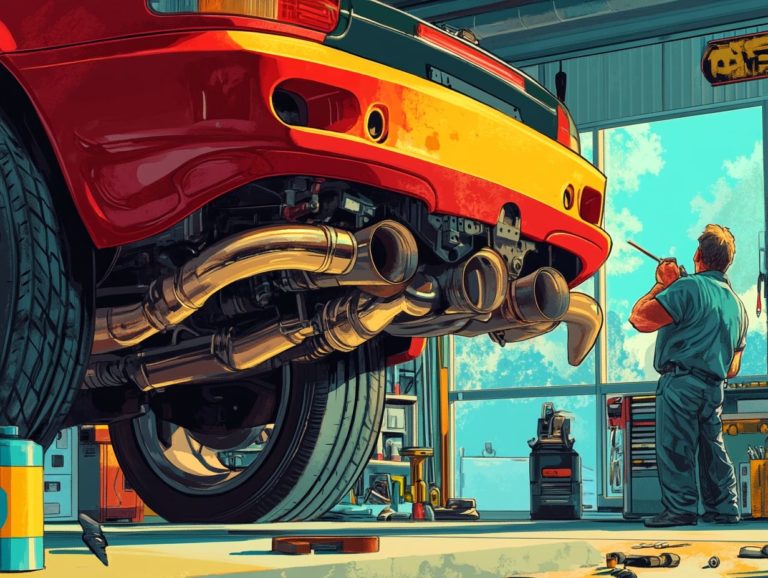What to Do When Your Car Makes a Weird Noise?
Every car owner understands that strange noises can be quite unsettling. They often hint at deeper issues lurking beneath the surface.
Suspension components often clunk. Brakes can make a relentless squeal. These sounds may come from many sources, each with different levels of severity.
This article will explore the common car noises you might hear. It also shares essential maintenance tips to keep your vehicle running smoothly.
Ready to listen closely to your car s conversations? Let s dive in!
Contents
Key Takeaways:

- Don’t panic when your car makes a weird noise. First, try to understand the common causes to identify the source.
- Follow simple steps to locate the problem and deal with it. For engine, suspension, steering, and brake noises, specific causes and solutions can help.
- Prevent future noises by regularly maintaining your car. Simple tasks like changing oil, checking tire pressure, and tightening loose parts ensure a quieter ride.
Understanding Car Noises
Understanding car noises is crucial for you as a car owner. These sounds are vital indicators of potential issues, ranging from minor annoyances to serious safety hazards.
By distinguishing between normal sounds and those that raise eyebrows, you can prevent costly repairs. Early detection can enhance your driving experience and bolster road safety.
Familiarity with common car noises helps you make timely interventions. This ensures your vehicle stays in excellent condition for years ahead.
Common Causes and Types of Noises
Common causes and types of noises in vehicles often point to specific components. Each one is a red flag that demands your immediate attention.
If you hear a persistent knocking or pinging noise, it may indicate engine timing issues or poor fuel quality. Ignoring these sounds can lead to serious engine damage.
High-pitched squeals are typically linked to the serpentine belt or a worn belt tensioner. If left unaddressed, they could lead to complete belt failure.
Recognize these warning sounds and prioritize regular inspections. Catching potential problems early ensures safe and smooth driving experiences.
Identifying the Source of the Noise
Identifying the source of noise is essential for addressing mechanical issues. This can prevent further damage and costly repairs.
Learn to differentiate sounds like a tapping noise signaling engine problems or a thumping sound indicative of tire issues. You can then take the necessary action.
Maintaining a detailed service history is invaluable. It helps track recurring problems, making it easier for mechanics to diagnose and resolve issues efficiently.
Quick identification saves you money and enhances the overall safety of your vehicle.
Steps for Locating the Problem
Locating the source of automotive noises requires a step-by-step method that begins with a thorough checkup for your car to identify any irregularities causing those unusual sounds. Start by paying attention to when the noises occur are they present during acceleration, braking, or turning? Document any accompanying conditions, such as fluctuations in dashboard temperature or fluid leaks.
These observations are essential during a mechanic’s inspection and can greatly contribute to your road safety.
Once you’ve gathered this information, conduct a visual inspection of your vehicle’s components. Focus on key areas like the engine bay, wheel wells, and undercarriage. Look for loose or damaged parts, such as belts, hoses, or brackets, which could be the culprits behind the noise.
Next, take a drive in a quiet area to hone in on the sound’s origin; consider shutting off the radio for better focus. Pay attention to any vibrations you feel through the steering wheel or seat, as they can provide valuable clues. Remember, investing time in diagnosing issues not only helps address potential problems early but also enhances your vehicle’s reliability and safety on the road.
Dealing with Engine Noises

Effectively addressing engine noises can prevent further complications and ensure your vehicle operates smoothly. Sounds like engine knocking or high-pitched whines may signal serious underlying issues, such as low engine oil or worn belts that need your immediate attention.
A vacuum leak can lead to performance issues, while irregularities in the cooling system might result in overheating and potential engine failure. Act quickly! Tackling these noises now can save you on repair costs and significantly enhance your car’s overall performance.
Causes and Solutions for Engine Noises
Engine noises can stem from various sources, and pinpointing the right solutions is key to keeping your vehicle running s smoothly and efficiently. Issues like worn-out spark plugs, low power steering fluid, or a malfunctioning cooling system can all contribute to those troubling sounds.
Embracing maintenance tips, such as regular oil changes, can help you prevent these engine issues and catch any problems before they spiral into costly repairs. Staying attuned to subtle shifts in sound can signal emerging issues.
For example, if you notice a persistent rattling, it might indicate loose parts or abnormal engine vibrations, which deserve your immediate attention. Regularly inspecting belts and hoses for wear can also play a vital role in reducing noise.
Ensuring that the exhaust system is leak-free is essential, as exhaust noises can often be misleadingly mistaken for engine problems. By incorporating these routine maintenance practices into your schedule, you not only enhance engine performance but also elevate your overall driving comfort.
Addressing Suspension and Steering Noises
Addressing suspension and steering noises is essential for ensuring a comfortable and safe driving experience. These sounds often signal significant mechanical issues that demand your immediate attention.
For instance, a clunking noise might suggest problems with the CV joint (which connects your wheels to your car) or worn wheel bearings. Other sounds could indicate suspension faults or steering issues that may compromise your vehicle’s handling.
If you choose to ignore these warnings, you risk facing more severe problems down the line, ultimately affecting both your safety and your vehicle’s performance.
Possible Issues and Fixes
Possible issues affecting your suspension and steering often make themselves known through distinct noises, each hinting at various fixes depending on the underlying problem. If you hear a persistent clunking noise, it may be a sign of worn-out suspension components or steering issues, such as loose tie rods, which call for immediate attention.
Utilizing effective maintenance tips can significantly reduce repair costs and extend the lifespan of these vital vehicle systems.
If you start to notice a squeaking sound during turns, this could indicate that your power steering fluid is low or that the pump is struggling. Regularly check your fluid levels and replace worn-out seals to avoid more significant issues. Inspecting bushings and ball joints for wear can uncover hidden problems. Routine wheel alignments enhance handling and minimize wear on your suspension parts.
Simple practices like rotating your tires and maintaining proper air pressure go a long way in ensuring that both your steering and suspension systems operate effectively for longer.
Handling Brake Noises
Effectively addressing brake noises is essential for maintaining both your vehicle’s safety and best braking performance. Sounds like squealing brakes typically signal wear and tear on your brake pads or rotors.
Don t ignore these sounds, as they can lead to significant repairs and serious safety concerns that may compromise your vehicle’s performance. By understanding the implications of these noises, you re enabled to take proactive measures to maintain your braking system and ensure your safety on the road.
Possible Causes and Solutions

Possible causes of those annoying brake noises, like squealing, often arise from worn-out brake pads or brake rotors that need your immediate attention for an effective fix. A mechanic can diagnose the wear and give you tailored recommendations, ensuring your braking system remains reliable and safe for everyday driving.
Dirt, moisture, or bad installation can cause those annoying sounds. Ignoring these noises might lead to more serious issues fast, such as reduced stopping power or damage to surrounding components.
Regular inspection and maintenance are crucial for a smooth ride! By staying vigilant, you can catch subtle changes before they escalate into bigger problems. Simple solutions, such as applying anti-squeal shims or opting for high-quality brake pads, can help alleviate some of these disturbances.
If you’re ever unsure, reach out to a professional for a thorough check-up it s worth the peace of mind!
Preventing Future Noises
Preventing future car noises is entirely within your reach through diligent maintenance practices and regular inspections that keep your vehicle in peak condition.
Effective maintenance strategies like routinely checking for fluid leaks, keeping an eye on dashboard temperature, and promptly addressing any unusual sounds can significantly enhance your car’s performance and longevity.
These proactive steps not only help ensure that minor issues don t snowball into costly repairs but also save you valuable time and money in the long run.
Maintenance Tips for a Quieter Ride
Implementing effective maintenance tips for a quieter ride can significantly enhance your car s overall performance while minimizing those pesky sounds that can spoil your driving experience. Regularly scheduled auto service, along with a meticulous service history, helps you spot potential issues before they escalate. This ensures a smooth and tranquil journey.
From replacing worn belts to checking wheel bearings, every component contributes to the harmony of your vehicle. Don’t overlook the importance of inspecting the exhaust system for leaks; a damaged system can add unwanted noise to your drive.
Keep an eye on tire inflation and alignment; they are crucial for reducing road noise and improving handling. Lubricating door hinges and checking the cabin insulation the material that helps keep sound from entering your car can further minimize vibrations and unwanted sounds.
By prioritizing these actionable maintenance practices, you can create a calm and enjoyable ride in your car while boosting its longevity and performance.
Frequently Asked Questions
What to Do When Your Car Makes a Weird Noise?
If your car is making a weird noise, it’s important to address it right away to prevent potential damage. Here are some steps to take:
What could be causing the weird noise in my car?

There are several potential reasons why your car may be making a strange noise. It could be due to a loose or damaged component, low fluids, or wear and tear on certain parts. It’s best to have a professional mechanic diagnose the issue.
Should I continue driving my car if it’s making a weird noise?
It’s not recommended to continue driving your car if it’s making a strange noise. This could indicate a serious problem that could worsen if not addressed immediately. Pull over safely and have your car inspected by a mechanic.
What if the noise only occurs when I accelerate or decelerate?
This type of noise could indicate an issue with your engine or transmission. It’s important to have it checked out as soon as possible to prevent further damage and potentially costly repairs.
Can I try to fix the noise myself?
If you have experience and knowledge about cars, you may be able to fix the issue causing the noise. However, it’s always best to have a professional diagnose and repair the problem to ensure it is properly resolved.
How can I prevent weird noises from occurring in the future?
Regular maintenance and check-ups on your car can help prevent strange noises from occurring. Keep up with oil changes, fluid top-offs, and any necessary repairs. Also, pay attention to any changes in your car’s performance and address them promptly.
Ready to ensure a quieter ride? Schedule your next service or check-up today!






